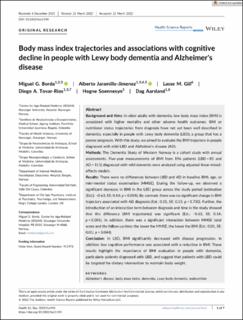| dc.contributor.author | Borda, Miguel Germán | |
| dc.contributor.author | Jaramillo-Jiménez, Alberto | |
| dc.contributor.author | Melvær, Giil Lasse | |
| dc.contributor.author | Tovar-Rios, Diego Alejandro | |
| dc.contributor.author | Sønnesyn, Hogne | |
| dc.contributor.author | Aarsland, Dag | |
| dc.date.accessioned | 2022-09-01T12:31:57Z | |
| dc.date.available | 2022-09-01T12:31:57Z | |
| dc.date.created | 2022-08-29T09:22:09Z | |
| dc.date.issued | 2022 | |
| dc.identifier.citation | Borda, M.G., Jaramillo-Jimenez, A. Melvær, G.I., Tovar-Rios, D.A., Sønnesyn, H. & Aarsland, D. (2022) Body mass index trajectories and associations with cognitive decline in people with Lewy body dementia and Alzheimer's disease. Health Science Reports, 5 (3). | en_US |
| dc.identifier.issn | 2398-8835 | |
| dc.identifier.uri | https://hdl.handle.net/11250/3015171 | |
| dc.description.abstract | Background and Aims
In older adults with dementia, low body mass index (BMI) is associated with higher mortality and other adverse health outcomes. BMI or nutritional status trajectories from diagnosis have not yet been well described in dementia, especially in people with Lewy body dementia (LBD); a group that has a poorer prognosis. With this study, we aimed to evaluate the BMI trajectory in people diagnosed with mild LBD and Alzheimer's disease (AD).
Methods
The Dementia Study of Western Norway is a cohort study with annual assessments. Five-year measurements of BMI from 196 patients (LBD = 85 and AD = 111) diagnosed with mild dementia were analyzed using adjusted linear mixed-effects models.
Results
There were no differences between LBD and AD in baseline BMI, age, or mini-mental status examination (MMSE). During the follow-up, we observed a significant decrease in BMI in the LBD group across the study period (estimation [Est.]: −0.63, SE: 0.14; p < 0.001). By contrast, there was no significant change in BMI trajectory associated with AD diagnosis (Est.: 0.05, SE: 0.15; p = 0.730). Further, the introduction of an interaction term between diagnosis and time in the study showed that this difference (BMI trajectories) was significant (Est.: −0.63, SE: 0.14; p < 0.001). In addition, there was a significant interaction between MMSE total score and the follow-up time; the lower the MMSE, the lower the BMI (Est.: 0.01, SE: 0.01; p = 0.044).
Conclusion
In LBD, BMI significantly decreased with disease progression. In addition, low cognitive performance was associated with a reduction in BMI. These results highlight the importance of BMI evaluation in people with dementia, particularly patients diagnosed with LBD, and suggest that patients with LBD could be targeted for dietary intervention to maintain body weight. | en_US |
| dc.language.iso | eng | en_US |
| dc.publisher | Wiley Periodicals LLC. | en_US |
| dc.rights | Navngivelse-Ikkekommersiell 4.0 Internasjonal | * |
| dc.rights.uri | http://creativecommons.org/licenses/by-nc/4.0/deed.no | * |
| dc.subject | BMI | en_US |
| dc.subject | demens | en_US |
| dc.subject | demens med Lewy-legemer | en_US |
| dc.subject | kognitiv funksjon | en_US |
| dc.title | Body mass index trajectories and associations with cognitive decline in people with Lewy body dementia and Alzheimer's disease | en_US |
| dc.type | Peer reviewed | en_US |
| dc.type | Journal article | en_US |
| dc.description.version | publishedVersion | en_US |
| dc.rights.holder | © 2022 The Authors | en_US |
| dc.subject.nsi | VDP::Medisinske Fag: 700::Klinisk medisinske fag: 750::Nevrologi: 752 | en_US |
| dc.source.pagenumber | 0 | en_US |
| dc.source.volume | 5 | en_US |
| dc.source.journal | Health Science Reports | en_US |
| dc.source.issue | 3 | en_US |
| dc.identifier.doi | 10.1002/hsr2.590 | |
| dc.identifier.cristin | 2046542 | |
| cristin.ispublished | true | |
| cristin.fulltext | original | |
| cristin.qualitycode | 1 | |

